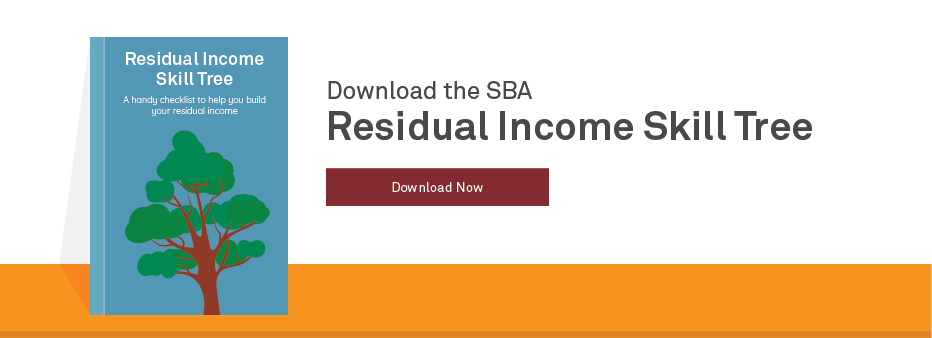What is passive income and what is residual income? The difference between residual and passive income depends on the industry in which these terms are being discussed. In an online business environment, the two terms are used interchangeably. In this environment, the terms typically mean a source of income that is automated. Residual income is income you receive after doing initial work or can be passive income that is being generated online. For example, Jane owns and operates her own yoga blog. On the blog, she sells yoga mats and apparel. Jane doesn’t have to actively try to make individual sales. The sales come in passively via the visitors who arrive at her blog.
In a financial environment, residual income is the money that a person has left over after their expenses are covered each month. Passive income, however, still has the same definition in a financial environment that it does in an online business environment.
Why the Meaning of Residual Income is Often Confused
So, why is there confusion about the meaning of residual income and passive income?
One reason that there is confusion between the two terms is because a residual is something that people can make when they’re getting passive income. For example, some stocks pay residuals or dividends to their investors. This means that the investor buys the stock and every year that stock pays a bit of money to the investor, so long as the venture is successful.
Stocks that pay residuals or dividends are a form of passive income. For this reason, people typically use the terms residual income and passive income interchangeably.
What Does Residual Income Mean in Online Business?
Residual income in an online business, and “residual income,” are often used interchangeably, but residual income in an online business has a different meaning than it does in the finance industry. Residual income refers to income that is generated after the labor has been done. This is typical of online businesses such as blogs, YouTube channels, and eBooks.
How to Make Residual Income Online
There are many ways that you can make residual income online, or in other words, make passive income with an online business. Online residual income is something readily available for those ready to explore income sources. Here are a few examples of how to make residual income online:
- Create a high-traffic blog and put affiliate links to another business’s products on your site.When visitors to your site click through and go to the other business’s product page, you will receive a small percentage as compensation. When a visitor from your site buys a product from the affiliate business, you will likely receive a larger percentage of compensation. This is just one way of earning passive income.
- Create an informational webinar and charge money for people to view it. For example, you’re a CPA who specializes in small business financing. You could put together a webinar where you explain the most important financial concepts that small business owners need to know. Maybe you charge $50 for the webinar and then offer 50% of that amount of money to any website that directs traffic to your webinar that results in a sale. It’s important to remember that, in order for this to be completely passive income, this webinar needs to be recorded. That way, you only put the labor in once and then you’re able to sell it multiple times.
- Create a subscription site for content and videos. Let’s sayyou have a culinary background and are looking to escape the foodservice industry grind. You start uploading cooking videos that instruct people on how to make different recipes, as well as provide information on culinary basics such as knife skills and sanitation best practices. You “gate” this content by charging a $5.00/month subscription fee. After a year of running this business, you could have 1,000 subscribers and be able to leave the foodservice industry grind behind, just from the extra money coming in. Creating an online presence may be a lot of work, but, the results of consistent passive income streams could certainly be worth it. Especially, if you use social media to promote your product.
What Does Residual Income Mean in the Finance Industry?
In the finance industry, residual income refers to the amount of money a person has left over in their personal spending account after their obligations are paid.
For example, Tom makes $4,000 a month after taxes. His rent costs $1,000. His student loans cost $500, his car payment is $300, and his utilities are roughly $200. This means that at the end of the month Tom has $2,000 of residual income. Sometimes, there is an estimate added in for things like monthly travel expenses and food expenses. So, Tom’s residual income may be closer to $1,000 at the end of the month. This is an important formula for banks when they’re looking at how much money they should loan to people.
Now suppose that Tom seeks a mortgage loan that may require about $1,000 a month for 10 years in order to be paid off. The bank will look at Tom’s income and expenses and see that he has $1,000 a month dedicated to his rent. This shows that Tom should be able to make his monthly payments on the loan.
But, let’s look at another example. Jack makes $2,500 a month after taxes. He and his two roommates each pay $800 a month for rent. Jack then pays $500 a month in student loans, his car payment is $400, and his utilities are $200. This means that Jack pays $1,900 a month for his cost of living, not including monthly travel and food expenses. Jack probably has a residual income of around $200 to $300 a month. For this reason, Jack probably wouldn’t be able to get a $1,000/month mortgage loan to buy a house because his residual income is so low.
Know the Difference Between Passive and Residual Income
Knowing the difference between passive and residual income is incredibly important, especially if you’re talking to someone in the financial services industry. That’s because—depending on who you’re talking to—the definitions can be completely different, even though the terms are often used interchangeably. Learn about passive income tax.

Next Steps: Want to learn more? Sign up for the Small Biz Ahead newsletter to receive a weekly roundup of the latest tools, trends, and resources designed to help you grow your business and learn more about key terms such as passive and residual income.





